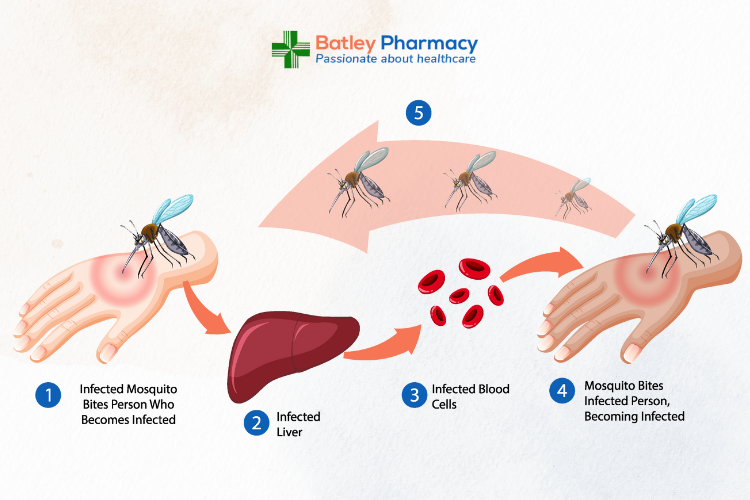Malaria continues to be a major global health concern, affecting millions each year. Travelling to malaria-endemic areas increases the risk of contracting this potentially fatal disease, making prevention crucial. The updated 2024 malaria prevention guidelines provide key measures to ensure a safe and healthy trip.
This guide covers malaria prevention for UK travellers, including malaria risk areas, recommendations and effective prevention strategies.

Understanding Malaria Prevention for UK Travellers
What is Malaria and How is it Transmitted?
Malaria is a mosquito-borne infection caused by Plasmodium parasites. It spreads through the bites of infected female Anopheles mosquitoes. Once in the bloodstream, the parasite travels to the liver where they multiply, leading to symptoms such as fever, chills, fatigue, sweating and in severe cases, organ failure or death.
Malaria Risk Areas for UK Travellers
In 2024, malaria continues to be prevalent in tropical and subtropical regions, making prevention crucial for UK travellers planning to visit high-risk areas.
The risk of malaria varies by region, with some areas posing a higher threat than others;
- Asia: High-risk destinations include India, Bangladesh, Sri Lanka, Nepal, Indonesia and parts of Thailand.
- Africa: Parts of Nigeria, Democratic Republic of Congo, Tanzania, Kenya and Ghana.
- Americas: Cases have been reported in parts of Central and South America, including Brazil, Peru, Columbia and limited areas in Mexico.
UK Government Malaria Advice
The UK government provides up-to-date malaria prevention guidelines for UK travellers. The NHS recommends following steps before travelling to high-risk areas for malaria;
Consult a travel health clinic
Based on your destination, get expert advice on malaria risk before travelling
Check if malaria tablets are required
Some regions require anti-malarial tablets, while others do not.
Update vaccinations
Ensure all routine and recommended vaccinations are up-to-date.
Malaria Prevention Strategies
- Avoid mosquito bites
Wear long-sleeved and light-colored clothing, as mosquitoes are attracted to dark colors. Use mosquito repellents, as they provide an extra layer of protection by reducing the risk.
- Stay in air-conditioned accommodation
Mosquitoes thrive in warm, humid environments. Stay in air-conditioned rooms as mosquitoes are less likely to survive in cooler, well-sealed spaces.
- Take preventive medication
Depending on the destination, the NHS recommends antimalarial drugs such as atovoquane or proguanil to be taken before, during or after travel as prescribed to ensure protection.
- Use insecticide-treated mosquito nets
Sleeping under insecticide-treated mosquito nets provides effective protection, mainly in areas with high malaria transmission. These nets kill or repel mosquitoes, reducing the risk of being bitten while sleeping.
Choosing the Right Malaria Medication for Travellers
- Atovaquone/Proguanil (Malarone) — Short course, well-tolerated
- Doxycycline — Affordable, may cause sun sensitivity
- Mefloquine (Lariam) — Effective, may be associated with rare psychiatric side effects
Note: Always discuss your medical history, allergies and side effects with your healthcare provider before or after the use of medication.
Malaria Vaccine UK — What You Should Know
Two vaccines RTS,S (Mosquirix) and R21/Matrix-M have been developed to be used for travelling to areas where Malaria is prevalent. Clinical trials have shown promising results, with some studies reporting efficacy rates for the Malaria vaccine as high as 75-80%.
While these vaccines provide progress in combating Malaria globally, they are not a part of routine vaccination programs in the UK. However, travellers from the UK to Malaria endemic regions are advised to take preventive measures.
Malaria-Free Travel Destinations
There are several Malaria-free countries, including;
Europe
Spain, Italy, Portugal, Croatia, France
Asia
Japan, South Korea, Singapore
Oceania
Australia and New Zealand
Americas
United States, Argentina, Belize
Conclusion: Stay Safe, Stay Informed
If you develop symptoms such as fever, chills, or headaches within weeks or months of returning from a Malaria-endemic area, seek medical help immediately, as early diagnosis improves treatment outcomes. Following the Malaria prevention guidelines 2024 ensures UK travellers can explore the world while staying healthy and protected.
FAQs.
The most effective way to prevent malaria when travelling to high-risk areas is by taking antimalarial medication, using mosquito repellents, and, where available, getting the malaria vaccine.
Your healthcare provider will advise you to start taking the medication before, during and anywhere from 1-4 weeks after travelling to a malaria-prone area.
It is advised to take malaria pills 1-2 days before travelling.
Malaria symptoms appear within a few weeks of the infection, including fever, chills, general weakness and discomfort.


